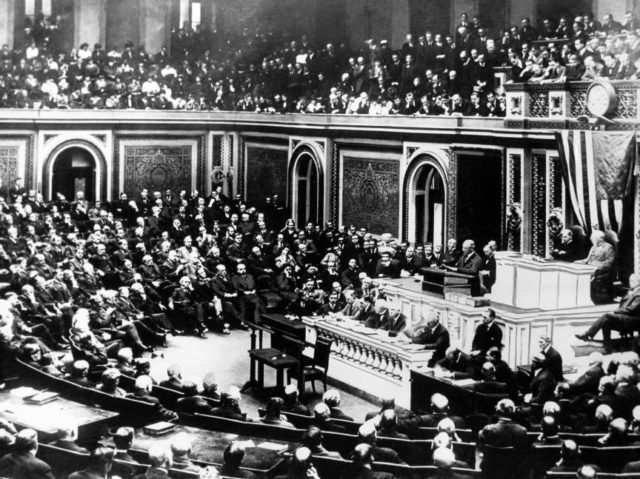EDITORS NOTE: On April 6, 1917, the United States joined the Great War. President Woodrow Wilson had tried in vain to avoid the global conflict now known as World War I, and called on Congress to declare war. By the time U.S. troops helped defeat Germany and end the conflict in 1918, more than 9 million people had died, including some 116,000 Americans. A conflict first fought on horseback and in trenches evolved into a modern war, waged with armored vehicles, air combat and mustard gas.
On the 100th anniversary of the declaration of war by Congress, the AP is republishing a version of its story.
___
April 6,1917
CONGRESS DECLARES WAR
WASHINGTON, APRIL 6 (AP)_The resolution declaring that a state of war exist between the United States and Germany, already passed by the Senate, passed the House shortly after 3 o’clock this morning by a vote of 373 to 50.
President Wilson will sign the resolution as soon as Vice President Marshall has attached his signature in the Senate. It formally accepts the state of belligerency forced by German aggressions and authorizes and directs the President to employ the military and naval forces and all the resources of the nation to bring war against Germany to a successful termination.
Without roll calls, the House rejected all amendments, including proposals to prohibit the sending of any troops overseas without congressional authority.
Passage of the resolution followed 17 hours of debate. There was no attempt to filibuster, but the pacifist group under the leadership of Democratic Leader Kitchin prolonged the discussion with impassioned speeches. Kitchin declared his conscience would not permit him to support the President’s recommendation that a state of war be declared.
Miss Rankin of Montana, the only woman member of Congress, sat through the first roll call with bowed head, failing to answer to her name, twice called by the clerk.
On the second roll call, Miss Rankin rose and said in a sobbing voice, “I want to stand by my country, but I cannot vote for war.”
For a moment then she remained standing, supporting herself against a desk and as cries of “Vote, vote,” came from several parts of the House, she sank back into her seat without voting audibly. She was recorded in the negative.
___
EDITORS NOTE: Jeannette Rankin was the first woman elected to Congress. After voting against World War I, she lost her bid for re-election. She eventually returned to Congress, in time to vote against the declaration of World War II. She was the only member of Congress to vote against both world wars.

COMMENTS
Please let us know if you're having issues with commenting.